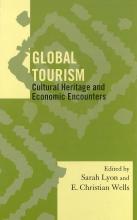Global Tourism: Cultural Heritage and Economic Encounters
Editor(s):
Sarah Lyon
E. Christian Wells

Book summary:
Global tourism is perhaps the largest scale movement of goods, services, and people in history. Consequently, it is a significant catalyst for economic development and sociopolitical change. While tourism increasingly accounts for ever greater segments of national economies, the consequences of this growth for intercultural interaction are diverse and uncertain. The proliferation of tourists also challenges classic theoretical descriptions of just what an economy is. What are the commodities being consumed? What is the division of labor between producers and clients in creating the value of tourist exchanges? How do culture, power, and history shape these interactions? What are the prospects for sustainable tourism? How is cultural heritage being shaped by tourists around the world?
These critical questions inspired this volume in which the contributors explore the connections among economy, sustainability, heritage, and identity that tourism and related processes makes explicit. The volume moves beyond the limits of place-specific discussions, case studies, and best practice examples. Accordingly, it is organized according to three overarching themes: exploring dimensions of cultural heritage, the multi-faceted impacts of tourism on both hosts and guests, and the nature of touristic encounters. Based on ethnographic and archaeological research conducted in distinct locations, the contributors’ conclusions and theoretical arguments reach far beyond the limits of isolated case studies. Together, they contribute to a new synthesis for the anthropology of tourism while simultaneously demonstrating how emerging theories of the economics of tourism can lead to the rethinking of traditionally non-touristic enterprises—from farming to medical occupations.
Publisher:
AltaMira Press
Praise:
Quote:
Scholars and students of tourism have long struggled against the common assumption that their subject is somehow trivial in its association with leisure and brief encounters. This volume goes a long way in demonstrating the multiple ways in which global tourism is fundamentally redefining local and regional economies and broadly shaping the ways in which virtually all the world's peoples are learning to re-present their heritage and identity to others. There is nothing trivial about it.
Credit:
Erve Chambers, University of Maryland
Quote:
These [chapters] challenge traditional writings in tourism studies that the editors and others have found to be caught in the bind of rehashing old conceptual orientations to the extent that the ideas are stale and in need of new thinking. The chapters outline these themes in a logical progression to address ideas of heritage, identity, and sustainability from the origins of tourism in particular locals, host/guest encounters, recognition of practices promoting the empowerment of women in tourism, and concerns about the environment through “staycations” to reduce the carbon impact of flying. Questions are carefully posed to engage the reader in the contemporary problems arising in tourism. Who benefits? What does the tourist gain from the experience? Does the practice of staged authenticity destroy the meaning and significance of the original practice or re-enforce understanding for a new generation? What is ecotourism? A refreshing view of these issues is provided through the lens of economic anthropology.
Credit:
Sue Taylor, Public Anthropologist in Residence, American University
A&S department affiliation:
Book URL:
https://www.amazon.com/Global-Tourism-Encounters-Anthropology-Monograph/dp/0759120919/ref=sr_1_fkmr1_1?s=books&ie=UTF8&qid=1544548516&sr=1-1-fkmr1&keywords=global+tourism+sarah+lion

